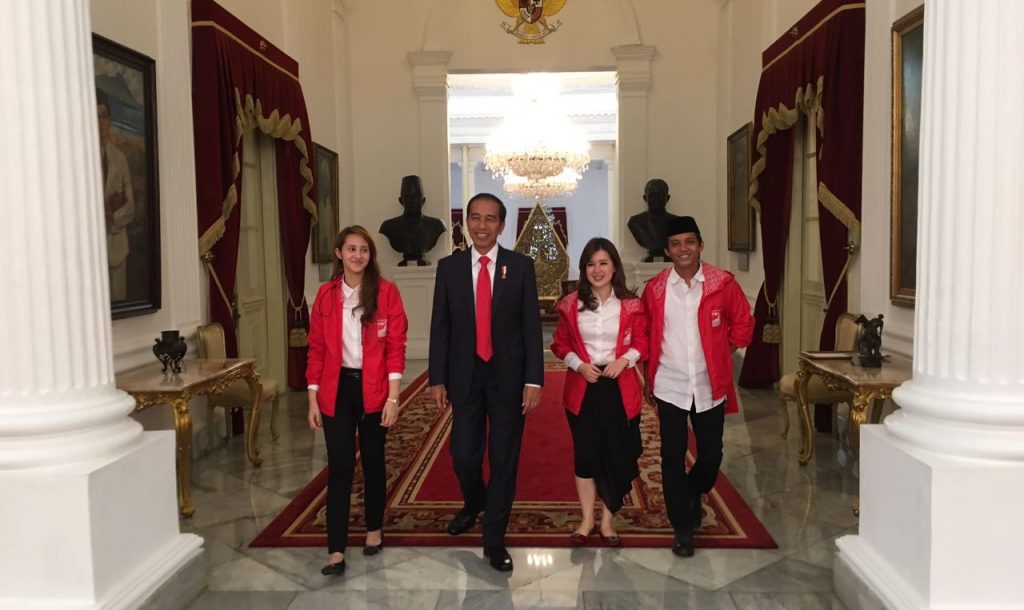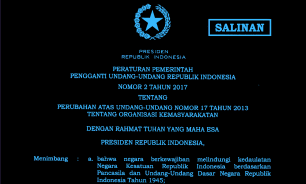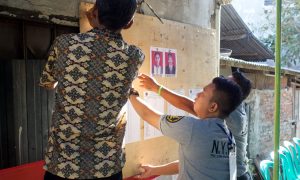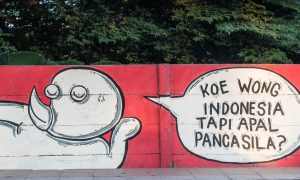The appearance of the Indonesia Solidarity Party (Partai Solidaritas Indonesia, or PSI)—bearing the slogan of “the millenials’ political party”—as a new participant in the 2019 elections has prompted public discussion. For some, the party is seen as providing the opportunity for a vehicle for alternative politics. But how promising is it really, in a political arena marked by transactionalism and predation?
In its official website, it’s declared that “PSI, as a new party, is no longer hostage to old political interests, bad track records, historical legacies and bad images from previous parties”. These claims, according to PSI, are substantiated by its recruitment of members from among former activists and young people (i.e. below 45 years old) with separate track records from old politicians and parties.
Given this platform, Ariel Heryanto has opined in one article that PSI’s emergence should be welcomed; as he says, all social change has historically rested on the role played by young people. But reflecting on the experience of Partai Keadilan Sejajhtera (PKS) and the former Partai Rakyat Demokratik (PRD), and the emergence of new figures imagined to be independent of old political interests—such as Joko Widodo, who in fact only gave limited hope of change—prompts Ariel to similarly not expect too much from PSI. He concludes that “the challenges of macro political conditions” is the factor that should limit such expectations.
platform, Ariel Heryanto has opined in one article that PSI’s emergence should be welcomed; as he says, all social change has historically rested on the role played by young people. But reflecting on the experience of Partai Keadilan Sejajhtera (PKS) and the former Partai Rakyat Demokratik (PRD), and the emergence of new figures imagined to be independent of old political interests—such as Joko Widodo, who in fact only gave limited hope of change—prompts Ariel to similarly not expect too much from PSI. He concludes that “the challenges of macro political conditions” is the factor that should limit such expectations.
In my opinion, there are several problems with Ariel’s viewpoint. First, his defining the role of youth as the “spearhead of all social change” is an excessive generalisation, which disregards the particular social and political conditions that make young people more likely to become the vanguard of social change. Which youth, and in which conditions? His description of the failure of both PKS and PRD is enough to defeat his essentialist historical argument here.
Second, the combination of doubts based on “macro political conditions” and hope because of PSI’s drawing sustenance from young political actors is also contradictory in its view of the relationship bewteen structure and agency. On the one hand, the doubts show that Ariel gives relative dominance to structural conditions in determining political actors’ manouevres. On the other hand, his hopes suggest that we can trust PSI’s new breed of politicans to have relative autonomy from those same marco conditions.
But a satisfactory explanation of the extent to which either of these factors is dominant is missing from Ariel’s article. His suggestion to PSI’s politicians that they should pay attention to substantive issues in public polemic emphasises his analysis’ tendency to emphasise personalistic understandings. Such a framing is of course more likely to give rise to optimism, but it’s ultimately problematic.
Most of all, his view of “youth” seems to contain a monolithic understanding of this category, one which neglects diversities of social class. The political orientations of young people from the lower classes in Indonesia, for instance, can’t be equated with those from the middle and upper classes.
The fluid ‘millennial’ political base
Departing from the limitations of existing explanations, an alternative viewpoint on the political futures being shaped by Indonesia’s millennial generation needs to be advanced. In my view, many of PSI’s claims are worthy of scepticism. There’s little chance that this party or its politicians can be separated from the domination of transactionalism and predatory politics, for two main reasons.
First, we haven’t so far seen any serious organisation based on the social base they categorise as “millennials”, apart from a particular brand of social media polemic to build popularity. The “millennial” category—aside from its cutting across classes—is also highly fluid, and as such can’t become an organised political force capable of controlling the behaviour of a party, legislative institution or government.
Nevertheless, looking at PSI’s anti-corruption and anti-intolerance rhetoric, combined with its social-media based campaign tools, it seems PSI is more inclined to target middle class youth. If that’s indeed the case, then it’s difficult to expect that this class segment will push for changes to Indonesia’s predatory politics.
In addition to this, the demographic reality of the sheer size of the younger generation has of course become the focus of parties well-experienced in winning electoral contests. Most Indonesian parties have youth organisations to target this group. Is it working? A survey of university students in 23 Indonesian provinces conducted by Ella Prihastini showed that young voters’ participation in the 2014 election actually declined compared with the two elections that preceded it. More than half of all voters between the ages of 17 and 29 didn’t vote in the 2014 legislative election. Another interesting finding was that 34% of young respondents said they preferred to vote for PDI-P, while only 5% said the same of PSI.
Apart from relying on social media, PSI’s efforts to contest the millennial vote include trying to piggy-back on the popularity of one of Indonesia’s largest youth organisations, the Nadhlatul Ulama-affiliated Gerakan Pemuda (GP) Ansor. Among other things, PSI’s rhetoric appears to be coordinated with the political stances of NU factions that promote the values of religious pluralism, particularly GP Ansor’s. Many PSI members have supported GP Ansor, given it excessive praise, and remain involved in its activities. PSI has unilaterally proposed Yaqut Cholil Qoumas, GP Ansor’s chairman, as one young figure worthy of consideration as Jokowi’s running mate for the 2019 presidential polls. But Ansor’s members are already a source of votes for Partai Kebangkitan Bangsa (PKB) and Partai Persatuan Pembangunan (PPP). Of course, both of these old and better-consolidated parties won’t sit silently if their own bases are contested by a newcomer.
The stamp of oligarchy
Second, because of its weak organisational basis, it’s almost impossible for PSI to avoid transactional politics. We can observe this by tracing the economic resources it’s using to consolidate its political strength. So far, PSI claims that it has relied only upon voluntary, no-strings-attached dues to pay for its political activities. But viewed in light of its weak organisational condition, statements like these are a daydream. How are they supposed to mobilise votes in a legislative election if they don’t have an organised social base to sustain them, amid the “high-cost politics” of a political arena dominated by predation?
Ample information indicates that PSI isn’t merely a home for new figures who haven’t dabbled in politics before, as the party says. The appearance of names like Sunny Tanuwidjaja and Jeffrie Geovanie in the lineup of PSI’s Advisory Board is enough of a caveat to demolish that claim.
Sunny is a former staffer of ex-Jakarta governor Basuki Tjahaja Purnama (Ahok). He has been questioned, and forbidden to travel abroad, by the KPK in relation to a bribery case surrounding the Jakarta Bay spatial plan, which has ensnared local parliamentary member M. Sanusi and the president director of property developer Agung Podomoro Land, Ariesman Widjaja.
Reporting from TEMPO magazine has shown that Sunny acted as a middleman between Ahok and developers responsible for the Jakarta Bay reclamation, including the owner of Agung Sedayu Group, Sugianto Kusuma (Aguan). When questioned by the KPK, Sunny also admitted that he served as a general manager of Peter Sondakh’s Rajawali Group. A report from Merdeka.com also revealed Ahok’s admission that Sunny’s cousin is married to Franky Oesman Widjaja, the son of Eka Tjipta Widjaja, who owns the Sinarmas conglomerate.
Jeffrie Geovanie, meanwhile, is known as a party-hopping politician, having being involved in PAN, Golkar, Nasdem, Perindo and PKB before landing at PSI. The official site of the DPD (Dewan Perwakilan Daerah, Indonesia’s second house of parliament), where he currently serves, notes that Jeffrie was previously a director of Singapore’s Trego Holdings Ltd, and a director of Bank Artha Prima Jakarta, owned by Tommy Winata.
In 2013 Kompas identified Jeffrie as the chairman of PT Panen Galeries Lafayette Indonesia—the local franchisee of France’s largest department store brand—which itself is a subsidiary of PT Mitra Adi Perkasa (MAP). MAP is a retail company which owns licenses for Starbucks, Zara and many other international brands. MAP is owned by Boyke Gozali and his uncle Sjamsul Nursalim, the businessman wanted in connection with the BLBI scandal who now lives as a fugitive in Singapore.
PSI’s chairwoman, Grace Natalie, has acknowledged that Jeffrie is one of the businesspeople funding the party’s activities. Looking at Jeffrie’s networks it’s difficult to dismiss the possibility that the conglomerates have played a part in underwriting PSI’s political activities. Moreover, Jeffrie is the head of the party’s Board of Advisors.
Meet the new party, same as the old party
At face value, then, the position of Jeffrie and Sunny in the organisational structure of PSI is a hint that this new party isn’t much different to the old. Given both of their backgrounds, PSI bears traces of also being closely linked to oligarchic networks. Sunny’s presence harms PSI’s claims to be a party that campaigns against corruption. The presence of the Jeffrie, meanwhile also demolishes PSI’s claims to be the party solely of new figures. The recent entry into PSI of Christianto Wibisono, a 73 year old former founder of PAN, just reemphasises its inconsistency on this front.
Jokowi forges a tool of repression
Indonesia's parliament has approved Jokowi's decree on mass organisations. Here's why the law threatens the freedoms of all Indonesians.
These conditions are the early signs of the consolidation of a party that already looks fragile, and caught up in transactionalism and predation. Built upon a weak social base, the politics PSI articulates primarily targets the middle class. It would be unsurprising if they also showed a tendency to adhere to a particular oligarchic faction, rather than attempt to fight oligarchy. When they enter the real political arena come election time, such oligarchic tendencies will only become more obvious, in turn hampering the possibility of change that challenges the interests of oligarchy. In this context, can anybody still claim that a milliennials’ party can be trusted to bring change?
 Facebook
Facebook  Twitter
Twitter  Soundcloud
Soundcloud  Youtube
Youtube  Rss
Rss 



